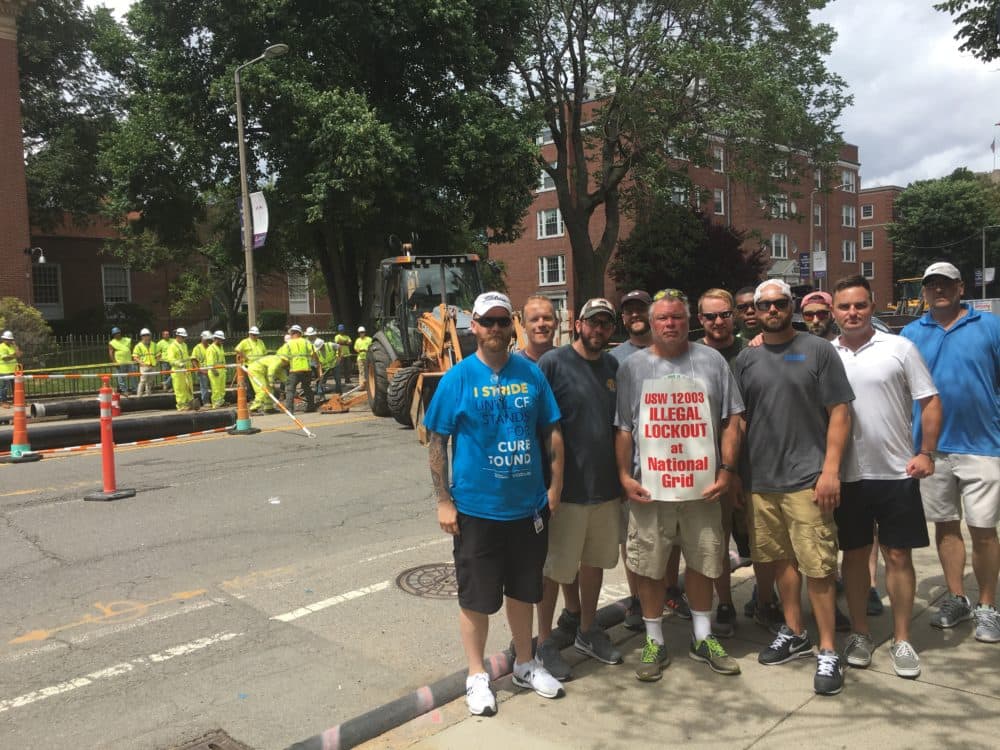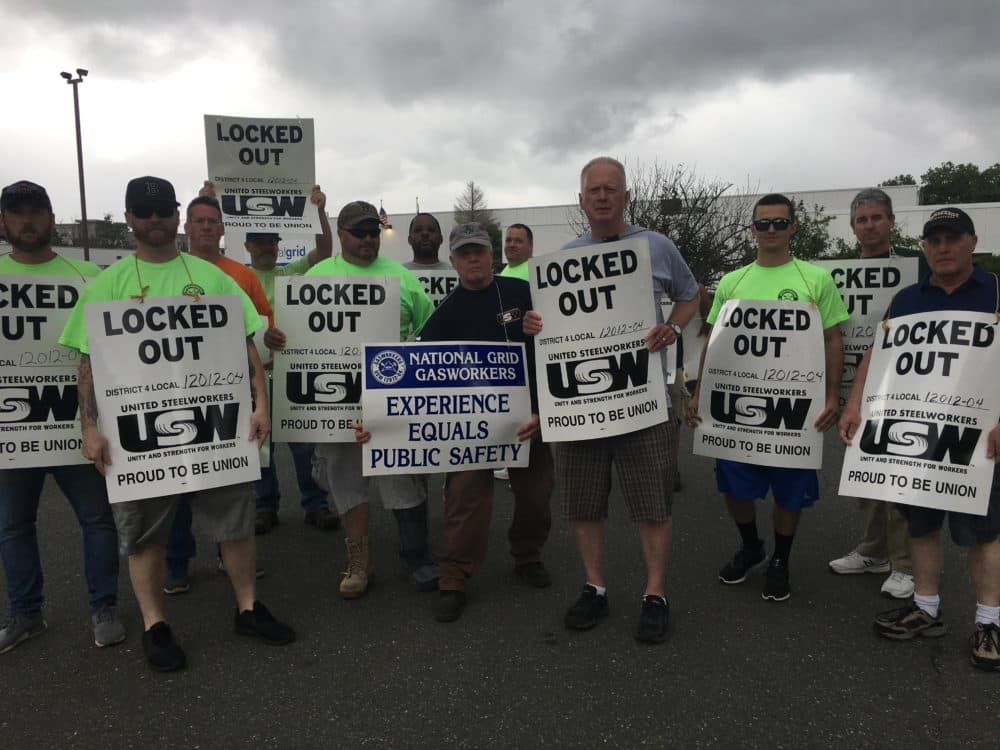Advertisement
As National Grid Lockout Enters Week 8, Some Say 'Hard Feelings' Will Linger Beyond Bargaining
Resume
For seven weeks, more than 1,200 union workers have been locked out of their jobs with National Grid, the state's largest gas utility.
As talks over a new contract have stalled, the lockout has dragged on, and the dispute has turned personal among people who have worked side by side for decades.
Marcy Reed is the president of one of the world's largest investor-owned utilities, but her office at National Grid's headquarters in Waltham is surprisingly small and bare.
"I didn't come to work here 30 years," Reed says. "I came figuring I'd work two or three, and 30 years later, I'm sitting here in front of you having loved almost every minute of it."
The low point in Reed's career with National Grid came at midnight on Sunday, June 25, when contract negotiations — which had gone on for months — between the utility and two United Steelworker unions came to a grinding halt.
"I was on the phone about every hour — midnight, 1 a.m., 2 a.m., 3 a.m.," she says. "When we ultimately decided at 5 a.m. they weren't going to agree to our final package, at that point we made the decision to inform them that we would be locking them out."
By dawn, the gates at National Grid's facilities that serve 700,000 gas customers in 85 communities in eastern Massachusetts were locked shut.
In Malden, passing cars honked support as members of the Steelworkers Local, some whom have worked there for nearly 40 years, protested in front of the utility's operational yard.

Among the protesters was Diane Towle, who carried a sign that said "Proud to be union." She has been with the company for 24 years.
"The union wanted to continue to bargain, but National Grid locked us out and National Grid will hopefully go back to the table and work with us," Towle says.
"Until then, we're out of work. Out of work."
The utility says it's willing to bargain daily, but the union says it is only negotiating once a week until the company changes its final offer.
Reed says no contract means no work, though locking out 1,200 people hasn't been easy.
"All of a sudden employees who [are your] friends and colleagues are not coming to work the next day, which means they're not getting a paycheck, they're not getting their health care," she says. "And all the sudden, I need to find a different way to do the work, so it was a tough decision. But it was the decision we made — and actually, I'd make it all over again."
That decision was a long time in the making. In 2016, negotiations for a five-year contract stalled, so the unions and utility settled to leave things as they were for two years. But the positions and passions that divided them are even deeper now.
"Well, I wouldn't say we were family to begin with," says John Buonopane, president of United Steelworkers Local 12012. "When you talk about the relationship, it hasn't been an easy one."
Buonopane stands with members of his union, picketing in front of a National Grid facility in Waltham. He says gas workers would settle for an extension of their old contract, and he blames National Grid for the lockout.
"They're looking at trying to squeeze some concessions out of 1,200 workers but they deserve those benefits, and this company makes $1 billion, so we're willing to work with them on the health insurance," he says. "We've told them that, and they understand that. They just haven't moved from their original position. They've really dug in."
Buonopane accuses the company of trying to undermine the union by requiring workers to pay more for their health insurance, and of dividing members by forcing new employees into 401(k)s instead of the company-funded pensions that current workers get.
"Who's to say next contract they're not going to come back to us and say, 'You know what, I know that it was just for the new hires this time, but this time, we want it back for everybody,' " he says.
But Reed says the company is just offering the same benefit package it's negotiated with 16 other unions.
"The cost of health care and pensions have just got to a point where we can't be passing that level of costs onto our customers," she says.
The utility is asking for a 13 to 17 percent rate hike next year. The average salary, according to National Grid, for a skilled, locked-out worker in the field is about $140,000 plus benefits. The work is grueling. In the winter, gas workers have to dig through up to four feet of frozen ground. In the summer, temperatures in a dangerous excavated hole can soar.
The company offered to increase pension contributions 10 percent and wages 14 percent. But during negotiations, it was also planning for a lockout, just in case.
"We wanted to it to be the best plan we never used, is what we called it," Reed says. "We knew we needed to keep the work going. We serve a product that's used 24/7. Our customers weren't going to wait for us."
To keep the gas flowing and respond to emergencies, the company redeployed 700 contract workers and put 600 supervisors into the field to replace the locked out union workers. The union workers have then been showing up at job sites and recording what they allege are safety violations by their replacements.
Reed calls the confrontations at work sites "unfortunate." She says security is provided for substitute contract workers and managers, and if any safety concerns are observed, prompt action is taken.
"Every person who's doing the real work on the gas mains has their state and federal certifications. Why, in heaven's name, would I put anyone on a job site that's not safe? What do I have to gain from that?" asks Reed.
Massachusetts Sens. Ed Markey and Elizabeth Warren have written letters to National Grid in support of the unionized workers. Several city councils in the National Grid service area, including Arlington, Cambridge and Somerville, have voted to prevent the locked out workers' replacements from doing new work in the towns.
The lockout has taken a toll on both sides. National Grid managers have lost their summer vacations and union workers their livelihoods.
Joe Kirylo, president of the other locked-out union, Boston Gas Local 12003 USW, believes in forgiving and forgetting, but says "some people are never going to get over this."
"When you have ill children and they cut your health care off, it's something you're not going to forget," he adds.
Robert McKersie, professor emeritus of industrial relations at Massachusetts Institute of Technology's Sloan School, warns the lockout could have long-term consequences.
"The fact that it is a lockout — it's a very aggressive action," McKersie says. "It's a very harsh negotiating tactic by an employer. And how are they going to mend fences and deal with all of the hard feelings when the family gets back together?"
McKersie says the toughest and most important relationships to repair are between union workers in the field and their managers who have replaced them since the lockout began.
Reed says she knows the utility has its work cut out for it.
"People have feelings. It will be tough to get past it, and I'd be naive if I thought that all those feeling are going away overnight," she says, "but working at National Grid, it's kind of like a family, so it's in that spirit we're going to bring them back."
The last time union gas workers in Massachusetts were locked out was a quarter of a century ago. It lasted 17 weeks. On Monday, National Grid's lockout begins week eight.
Editor's note: An attribution about the average salary of a National Grid worker has been added to this story.
This article was originally published on August 13, 2018.
This segment aired on August 13, 2018.
